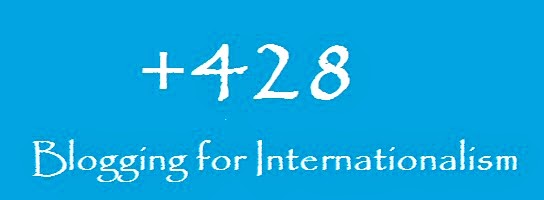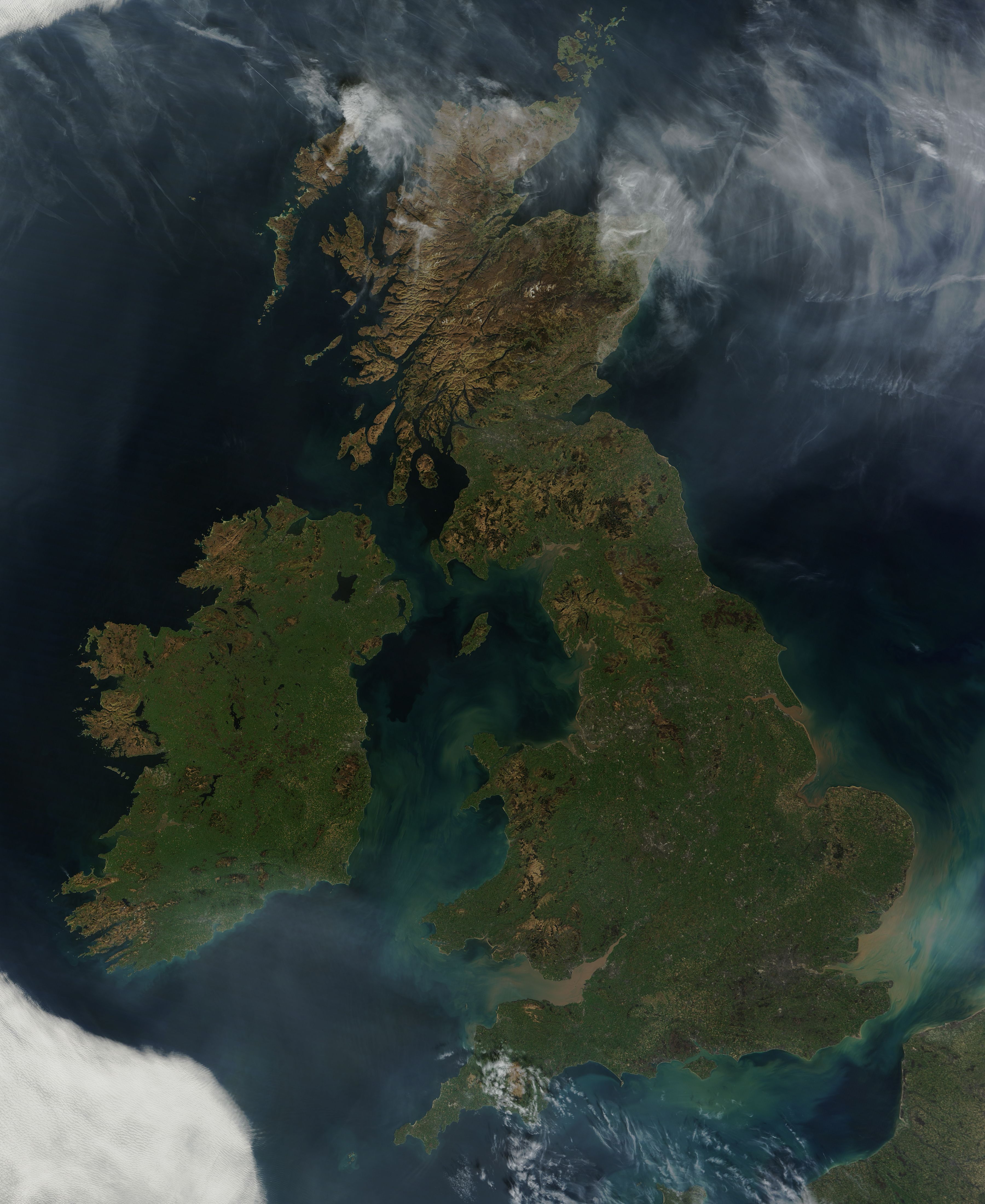The village of Ousby in Cumbria sits upon the school bus route which I took many times when I was living in the Eden Valley near Penrith. What I was unaware of was that in times past Ousby was one of the luckiest communities in England. You won't find a War Memorial in the village for those who perished in the 1914-1918 conflict. You might think 'my goodness, what a scandal how can they not care about their war dead?!' But that's just it - there are no war dead. For Ousby is one of only 53 'Thankful villages' in all Britain, those parishes that lost no lives in the First World War. 53. And that's it. They're all in England and Wales with none in Scotland. Further more only 13 of these thankful villages (or parishes) lost no lives in the Second World War either and Ousby isn't among them.
It goes to show the very scale of the casualty list from World War One. Nearly a million people from the UK died as a result of the conflict, the vast majority being soldiers and this accounted for 2% of the population. And next year the outbreak of this disastrous event, which 'lost a generation', will be 100 years ago. We should mark the events of World War One but not use them as an excuse to celebrate.
Sunday 29 December 2013
Thursday 31 October 2013
Jobcentre Plus needs to earn its Plus
Earlier this year I experienced a double irony. Barely a couple of hours after it was announced that Margaret Thatcher had died I went for a job interview. Nine days later I went for another job interview at the same time Thatcher's funeral was taking place. It would be another few weeks before I went for another interview this time with no significant coincidence. It's ironic of course that I went for job interviews on the two key moments at the end of Thatcher's life because of course it was dear old Maggie who made thousands unemployed during her eleven years as Prime Minister and now she had passed away here I was with two opportunities to return to employment. Regrettably I was unsuccessful at both so perhaps it was in fact ominous.
What today's generation of Tories are doing certainly doesn't help and now we have those who want jobs but can't get jobs being further penalised for being lazy. The Tories want to make those who can't find work go out and spend hours in crap jobs just to earn their benefits. We've probably all heard the recent and shocking case of Cait Reilly who was made to give up the more meaningful voluntary work she was already doing at a museum to work at Poundland stacking shelves - just to earn her Jobseeker's Allowance! It is truly patronising that the UK Government can descend to this level because many of us who want to work are all too eager to go and give our time and energy to volunteer for charities other organisations. We like going out and giving our services in those hours because the alternative is hardly pleasing - sitting at home feeling bored and useless.
What today's generation of Tories are doing certainly doesn't help and now we have those who want jobs but can't get jobs being further penalised for being lazy. The Tories want to make those who can't find work go out and spend hours in crap jobs just to earn their benefits. We've probably all heard the recent and shocking case of Cait Reilly who was made to give up the more meaningful voluntary work she was already doing at a museum to work at Poundland stacking shelves - just to earn her Jobseeker's Allowance! It is truly patronising that the UK Government can descend to this level because many of us who want to work are all too eager to go and give our time and energy to volunteer for charities other organisations. We like going out and giving our services in those hours because the alternative is hardly pleasing - sitting at home feeling bored and useless.
Plus or minus?
Sunday 27 October 2013
How should the so-called 'British Isles' be known?
I will reveal exclusively here in this post two names I propose for the islands off the north-west coast of Europe commonly known as the British Isles. You may wonder why I'm suggesting alternative names when we already have a name we're all familiar with. But I feel the British Isles is the wrong name. Great Britain is the right name for the main island and British its appropriate adjective.
The British Isles is an unpopular name in the Republic of Ireland for the simple reason that the country is part of neither Great Britain nor the United Kingdom. So it is a wholly inappropriate name. An agreement should be found perhaps through the British-Irish Council on what would be a suitable alternative. For now I will just stick to the British-Irish Isles. But here are the two suggestions I'd like to put forward:
The British-Irish Isles
The British Isles is an unpopular name in the Republic of Ireland for the simple reason that the country is part of neither Great Britain nor the United Kingdom. So it is a wholly inappropriate name. An agreement should be found perhaps through the British-Irish Council on what would be a suitable alternative. For now I will just stick to the British-Irish Isles. But here are the two suggestions I'd like to put forward:
Friday 11 October 2013
THE WALL OF SHAME
In the Scottish Independence debate we can all agree to disagree about what the best future is for Scotland and what it will deliver for each and every one of us. But there is no defending the indefensible. And when a unionist decides that simply because a pro-indy person doesn't share their view about the political union with England then the pro-indy person somehow dislikes the social union with England then clearly that unionist has an axe to grind. And the very lowest such a unionist has been known to sink is to refer to a supporter of Scottish independence as 'anti-English'. This attempt to turn a simple political disagreement into a deep psychological analysis about an opponent's motives has no place in a mature debate.
Many of us who are voting Yes in this referendum are English like myself. We're maybe a minority of the English voters but we still count. The idea that just because of my political views I am inherently anti-English is frankly insulting and anybody who suggests we are anti-English deserves to be named and shamed.
Therefore, I have compiled a list of unionists who have referred to the SNP or supporters of independence in general as anti-English, Anglophobic or racist or used similar defamatory terms to describe them. It will be updated every time somebody makes an offending comment.
So in no particular order, here is the Wall of Shame:
James MacMillan
Source: http://blogs.telegraph.co.uk/culture/jmacmillan/100059628/alex-salmond-is-exploiting-scotlands-reservoir-of-anti-englishness-dont-be-surprised-if-it-overflows/
Tom Harris
Source: http://wingsoverscotland.com/under-the-bridge/
George Foulkes
Source: http://www.scotsman.com/news/politics/top-stories/foulkes-snubs-mcleish-s-call-to-apologise-for-snp-racism-claim-1-917905
Brian Wilson
Source: http://www.scotsman.com/the-scotsman/opinion/comment/brian-wilson-snp-convert-to-olympic-supporters-1-2442676
Michael Kelly
Source: http://www.scotsman.com/the-scotsman/opinion/comment/michael-kelly-another-fine-mess-looming-over-horizon-1-2801225
David Maddox
Source: http://thesteamie.scotsman.com/viewpost.aspx?id=67
Steve James
Source: http://www.wsws.org/en/articles/2011/09/scot-s14.html
Nigel Farage
Source: http://www.bbc.co.uk/news/uk-scotland-22566180
Duncan Banatyne
Source: http://www.scotsman.com/news/celebrity/scottish-independence-duncan-bannatyne-backs-union-1-3081713
Duncan Stephen
Source: http://doctorvee.co.uk/2005/09/15/the-anti-scottish-snp/
Archbishop Cranmer
Source: http://archbishop-cranmer.blogspot.co.uk/2012/01/alex-salmonds-anglophobic-racism.html
Source: http://reality-insanity.blogspot.co.uk/2012/10/how-snp-uses-anglophobia-to-split-union.html
Donald Findlay QC
Source: http://www.boards.ie/vbulletin/showthread.php?t=2056286028
Susan Dalgety
Source: http://www.heraldscotland.com/civil-servant-who-made-snp-racist-jibe-quits-key-post-1.827705
John Redwood
Source: http://www.heraldscotland.com/politics/political-news/redwood-snp-anti-english.17045479
Jonathan Calder
Source: http://liberalengland.blogspot.co.uk/2008/07/snp-candidate-in-glasgow-east-is-anti.html
Malcolm Rifkind
Source: http://www.telegraph.co.uk/news/uknews/1328819/Rifkind-accuses-SNP-in-race-row.html
K the Unionist
Source: http://ktheunionist.blogspot.co.uk/2013/03/the-scottish-nationalists-are-anti.html
The Orange Torch
Source: http://www.britishtogether.co.uk/news2.php?action=viewArticle&articleId=1
John Major
Source: http://www.heraldscotland.com/news/home-news/john-major-scottish-nationalists-use-anti-english-sentiment-to-irritate-and-enrage.1385723008
Melanie Phillips
Source: http://m.youtube.com/watch?v=tO7YxtlTKRY
Kev Milne
Source: https://www.youtube.com/watch?v=af86HgDOs4Y
Tom Morton
Source: http://www.theguardian.com/commentisfree/2014/apr/22/scots-not-morally-superior-solidarity-south-of-Carlisle
Fiona Laird
Source: http://www.theguardian.com/commentisfree/2014/apr/29/british-scotland-independence-vote-union
For the sake of integrity this wall can only include people who have been explicit in their branding of supporters of independence as anti-English or such-like. People who have implied that to support independence is to be anti-English but haven't said so explicitly aren't included and it is with some regret. Douglas Alexander may be considered one of them having delivered no fewer than three or four speeches over the past year talking about anyone who supports independence as wanting to walk away from friends and family in the rest of the UK. You can read a selection his recent speeches, here, here, and here. Read them and decide for yourself if they constitute a smearing of supporters of independence as anti-English as I personally believe they do.
Some people who have in the past described pro-independence people as anti-English are forgiven, at least for the time-being, including Billy Connelly not because I like him as a comedian (he's an absolute legend of course!) but because he has recently chosen to keep himself out of the debate and not judge. Andrew Marr is exempt as he was referring to the existence of anti-Englishness in Scotland which I don't doubt is still a problem in some places though I would question his wisdom in juxtaposing it with mention of the origins of the SNP.
Comments are welcome and encouraged especially if you can find more people who share the attitude of the idiots listed above.
Many of us who are voting Yes in this referendum are English like myself. We're maybe a minority of the English voters but we still count. The idea that just because of my political views I am inherently anti-English is frankly insulting and anybody who suggests we are anti-English deserves to be named and shamed.
Therefore, I have compiled a list of unionists who have referred to the SNP or supporters of independence in general as anti-English, Anglophobic or racist or used similar defamatory terms to describe them. It will be updated every time somebody makes an offending comment.
So in no particular order, here is the Wall of Shame:
James MacMillan
Source: http://blogs.telegraph.co.uk/culture/jmacmillan/100059628/alex-salmond-is-exploiting-scotlands-reservoir-of-anti-englishness-dont-be-surprised-if-it-overflows/
Tom Harris
Source: http://wingsoverscotland.com/under-the-bridge/
George Foulkes
Source: http://www.scotsman.com/news/politics/top-stories/foulkes-snubs-mcleish-s-call-to-apologise-for-snp-racism-claim-1-917905
Brian Wilson
Source: http://www.scotsman.com/the-scotsman/opinion/comment/brian-wilson-snp-convert-to-olympic-supporters-1-2442676
Michael Kelly
Source: http://www.scotsman.com/the-scotsman/opinion/comment/michael-kelly-another-fine-mess-looming-over-horizon-1-2801225
David Maddox
Source: http://thesteamie.scotsman.com/viewpost.aspx?id=67
Steve James
Source: http://www.wsws.org/en/articles/2011/09/scot-s14.html
Nigel Farage
Source: http://www.bbc.co.uk/news/uk-scotland-22566180
Duncan Banatyne
Source: http://www.scotsman.com/news/celebrity/scottish-independence-duncan-bannatyne-backs-union-1-3081713
Duncan Stephen
Source: http://doctorvee.co.uk/2005/09/15/the-anti-scottish-snp/
Archbishop Cranmer
Source: http://archbishop-cranmer.blogspot.co.uk/2012/01/alex-salmonds-anglophobic-racism.html
Adzam Ruhul
Donald Findlay QC
Source: http://www.boards.ie/vbulletin/showthread.php?t=2056286028
Susan Dalgety
Source: http://www.heraldscotland.com/civil-servant-who-made-snp-racist-jibe-quits-key-post-1.827705
John Redwood
Source: http://www.heraldscotland.com/politics/political-news/redwood-snp-anti-english.17045479
Jonathan Calder
Source: http://liberalengland.blogspot.co.uk/2008/07/snp-candidate-in-glasgow-east-is-anti.html
Malcolm Rifkind
Source: http://www.telegraph.co.uk/news/uknews/1328819/Rifkind-accuses-SNP-in-race-row.html
K the Unionist
Source: http://ktheunionist.blogspot.co.uk/2013/03/the-scottish-nationalists-are-anti.html
The Orange Torch
Source: http://www.britishtogether.co.uk/news2.php?action=viewArticle&articleId=1
John Major
Source: http://www.heraldscotland.com/news/home-news/john-major-scottish-nationalists-use-anti-english-sentiment-to-irritate-and-enrage.1385723008
Melanie Phillips
Source: http://m.youtube.com/watch?v=tO7YxtlTKRY
Kev Milne
Source: https://www.youtube.com/watch?v=af86HgDOs4Y
Tom Morton
Source: http://www.theguardian.com/commentisfree/2014/apr/22/scots-not-morally-superior-solidarity-south-of-Carlisle
Fiona Laird
Source: http://www.theguardian.com/commentisfree/2014/apr/29/british-scotland-independence-vote-union
For the sake of integrity this wall can only include people who have been explicit in their branding of supporters of independence as anti-English or such-like. People who have implied that to support independence is to be anti-English but haven't said so explicitly aren't included and it is with some regret. Douglas Alexander may be considered one of them having delivered no fewer than three or four speeches over the past year talking about anyone who supports independence as wanting to walk away from friends and family in the rest of the UK. You can read a selection his recent speeches, here, here, and here. Read them and decide for yourself if they constitute a smearing of supporters of independence as anti-English as I personally believe they do.
Some people who have in the past described pro-independence people as anti-English are forgiven, at least for the time-being, including Billy Connelly not because I like him as a comedian (he's an absolute legend of course!) but because he has recently chosen to keep himself out of the debate and not judge. Andrew Marr is exempt as he was referring to the existence of anti-Englishness in Scotland which I don't doubt is still a problem in some places though I would question his wisdom in juxtaposing it with mention of the origins of the SNP.
Comments are welcome and encouraged especially if you can find more people who share the attitude of the idiots listed above.
Monday 7 October 2013
Identity politics has lost the plot
Just the other day I was in Edinburgh about to walk up Calton Hill (not with the march but certainly in their footsteps) when I passed a Scotsman newsagents with a board that said something like "NEW POLL WORRY FOR NO CAMPAIGN". Oh goody I thought can't wait to read it! Then later that evening I went online to the Scotsman website to find the poll only to discover that it was the findings from the census two years ago and in particular the National Identity question. 63% said they were "Scottish only". Another 18% said they were "Scottish and British". There was a simple flaw to this analysis which is that it provided you with a blank space to write in and just because you don't write something down doesn't mean you don't use it to describe yourself. Even many of the people who fully intend to vote No next year and quite comfortably call themselves British on many occasions would have simply put down 'Scottish' on the form. The reason they didn't put down 'and British' is because, well, they've already said they're British. They've said they're British by saying they're Scottish, it's just they're being more specific. Given the census has to be filled in (for fear of a £1000 fine which would be better spent on a holiday in the Caribbean (or more specifically Barbados)) then it is as scientific as you'll get a poll to be. Unionists should take note, it's not a case of being Scottish and British - rather it's a case of being Scottish THUS British. And for many supporters of Scottish independence, like myself, it's simple geography. Being British is like being European but on a smaller scale. There's the eponymous political union but there's also the fundamental concept from which the union is named. I'd rather relate to the more permanent. Although I support the idea of the European Union that is not the reason I feel European. I'm European because I'm from the continent of Europe. Likewise I'm British because I come from the simple geographical concept of Britain, that is Great Britain. I call myself British but I do not feel it is a nationality, that's why I didn't put it down in the census. And if I wanted to put down 'British' and 'European' on the census why not go the whole hog and put down 'English', 'South British', 'British', 'North-West European', 'European' and 'Eurasian'?
Tuesday 3 September 2013
How might Murray's success inspire our sporting culture?
There is little question of Andy Murray being British and his 2013 Wimbledon victory being a success for tennis fans across Great Britain and Ireland. Moreover history will always record his triumph as British - just take a look at Joshua Pim, for example, in the list of Wimbledon men's singles champions. Pim was himself Irish, born and bred in the now Republic of Ireland before it became independent. Yet although his biography shows his nationality with the St Patrick's Cross his Wimbledon titles are shown with the Union Jack.
We all remember the fuss made after Alex Salmond 'photo-bombed' David Cameron but Salmond was keen to make the point that this was Scotland's first Wimbledon victory since Harold Mahony in 1896. If Andy Murray had been from the Republic of Ireland and the Taoiseach had unfurled the Irish tricolour above David Cameron then commented on him being the first Irish champion since Joshua Pim nobody would have criticised him for that whatsoever. Cameron might have been mildly embarrassed but nothing more. So Alex Salmond's flag waving was only as bad as the mere idea of politicians waving flags at Wimbledon.
Tuesday 20 August 2013
Labour for Independence and the non-nationalist SNP members
Better Together's supposed positive campaign for the union disappears completely beneath their the latest shenanigans. Attempting to smear the Labour for Independence campaign and describe it as an SNP front was incredibly hypocritical and pathetic. I'll come to the hypocrisy in a little later. But if it is the case that there are SNP members then that says a lot more about the present Scottish Labour Party than it does about the Scottish National Party.
It's fair to admit that the SNP were founded nationalistically - nationhood and the feeling that Scotland could only feel properly represented as a nation if it was independent were what formed the driving force behind Scottish nationalism. But the idea that everyone in the SNP has the same motivation is short-sighted. Of the main four parties in Scotland the SNP is the only one that stands on a party platform of Scottish independence. So many people join the SNP specifically because they are a powerful voice for independence and even though their personal motivation for supporting independence is social justice or better democracy and not plain nationalism they see in the SNP many of the values they hold dear.
 |
| Labour for Independence logo |
It's fair to admit that the SNP were founded nationalistically - nationhood and the feeling that Scotland could only feel properly represented as a nation if it was independent were what formed the driving force behind Scottish nationalism. But the idea that everyone in the SNP has the same motivation is short-sighted. Of the main four parties in Scotland the SNP is the only one that stands on a party platform of Scottish independence. So many people join the SNP specifically because they are a powerful voice for independence and even though their personal motivation for supporting independence is social justice or better democracy and not plain nationalism they see in the SNP many of the values they hold dear.
Tuesday 25 June 2013
A future monarchy for a future Scotland
It is one of the smaller talking points in the debate about Scotland's future but in the month of the 60th anniversary of the Coronation the question of who should be the head of state is still quite an emotive topic among many. Although the unionist politicians are keen to throw the promise of keeping the Queen onto the long list of 'nationalist claims' it is more a matter of fact that the Queen, on day one of independence, will be Scotland's sovereign.
Not only is it Alex Salmond's express wish to retain the monarchy it is also highly unlikely she can be removed from her role in Scotland without first consulting the public. The Queen, with the best health provision possible and remaining in remarkable shape for an 87 year-old woman could easily to be with us beyond her 100th birthday in 2026 a whole decade after Scotland's projected year of independence. So the majority of Scotland's population with its former unionists and people who are open-minded on the issue of the monarchy are going to vote to keep the Queen and her heirs.
I won't make a secret that I'm one of those who would vote to keep the Queen as head of state. But I also believe the monarchy needs its reforms. However, the question of the monarchy is secondary to the much bigger questions about Scotland's economic performance and pursuit of social justice.
Not only is it Alex Salmond's express wish to retain the monarchy it is also highly unlikely she can be removed from her role in Scotland without first consulting the public. The Queen, with the best health provision possible and remaining in remarkable shape for an 87 year-old woman could easily to be with us beyond her 100th birthday in 2026 a whole decade after Scotland's projected year of independence. So the majority of Scotland's population with its former unionists and people who are open-minded on the issue of the monarchy are going to vote to keep the Queen and her heirs.
The current Royal Standard as used in Scotland
I won't make a secret that I'm one of those who would vote to keep the Queen as head of state. But I also believe the monarchy needs its reforms. However, the question of the monarchy is secondary to the much bigger questions about Scotland's economic performance and pursuit of social justice.
Sunday 2 June 2013
Independence is where Scotland's future lies
There is a backstory to why I support independence for Scotland at the next opportunity. Independence is normal for countries around the world and full sovereignty has practically become the standard for defining a country. But I haven't always believed in Scottish independence so I would regard myself as very much a convert to the cause.
So let's go straight back to the beginning. At five years of age already with over two years of memories behind me we are travelling back on the boat from Sweden. I hear my sister mention that we are returning 'to England'. Of course that's true as the boat was to dock in Harwich. However, this being my first introduction to the seven-letter name and having not yet heard 'Scotland' uttered I naturally thought that England included my area round where I lived in what I now know to be Southern Scotland. When I was corrected within a year of this misunderstanding I began taking it for granted that Scotland and England were two different countries. And around the age of eight or nine I learned the horrid truth after reading some atlases that officially they were both part of the same 'country'. I decided this mattered and when we were given the exercise of identifying the countries to which a list of European capital cities belonged I came across London and wrote beside it, 'Great Britain.' The teacher wasn't happy about this and asked me to correct it to 'England'. There must have been one of two reasons for this. One was that the teacher was a Scottish nationalist. The other was that the teacher felt that the idea of countries within a larger country was a rather awkward and confusing thing to discuss and everyone was at that point used to 'England and Scotland' or 'Scotland and England'. Why complicate that?
So let's go straight back to the beginning. At five years of age already with over two years of memories behind me we are travelling back on the boat from Sweden. I hear my sister mention that we are returning 'to England'. Of course that's true as the boat was to dock in Harwich. However, this being my first introduction to the seven-letter name and having not yet heard 'Scotland' uttered I naturally thought that England included my area round where I lived in what I now know to be Southern Scotland. When I was corrected within a year of this misunderstanding I began taking it for granted that Scotland and England were two different countries. And around the age of eight or nine I learned the horrid truth after reading some atlases that officially they were both part of the same 'country'. I decided this mattered and when we were given the exercise of identifying the countries to which a list of European capital cities belonged I came across London and wrote beside it, 'Great Britain.' The teacher wasn't happy about this and asked me to correct it to 'England'. There must have been one of two reasons for this. One was that the teacher was a Scottish nationalist. The other was that the teacher felt that the idea of countries within a larger country was a rather awkward and confusing thing to discuss and everyone was at that point used to 'England and Scotland' or 'Scotland and England'. Why complicate that?
Subscribe to:
Posts (Atom)





